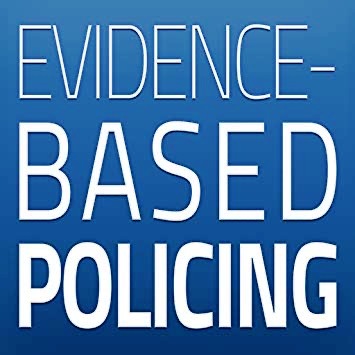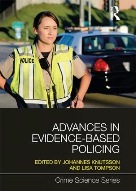EVIDENCE FOR EVIDENCE BASED POLICING

Evidence-Based Policing (EBP) is a technique of formulating policy and tactical decision-making for police organisations. It is a practice of steering and leading policing with the intention of using evidence not only to drive the systematic application of key strategies or tactics but also for testing and tracking them. It has its seeds in the larger trend towards evidence-based practices.
 EBP was first outlined by Lawrence Sherman in 1998. Even though the use of experiments to determine better-policing methods was done several decades earlier before Sherman defined it. For instance, the Police Foundation that was founded in 1970 and in 1971-72 worked with the Kansas City Police Department to perform a landmark survey on car patrols. In the early 1980s, Sherman and Richard Berk carried out a famous experiment called the Minneapolis Domestic Violence Experiment (MDVE). Their experiment revealed that arresting domestic violence suspects was a deterrent against repeat offending. The MDVE is remarkable for three reasons. First, it was the first controlled field experiment in which police officers’ responses to a specific problem in this instance misdemeanour-level assault of a spouse were dictated by random assignment rather than officer discretion. Second, it contributed to a nationwide propensity toward pro arrest policies in major city police departments. Third, because the conclusions of the research were counterintuitive to existing ”common sense” on the problem, the National Institute of Justice (NIJ) financed its only major initiative to confirm research, the Spousal Abuse Replication Project (SARP). The study had an “almost unprecedented consequence in shifting then-current police practices.”Sherman later worked with fellow criminologist David Weisburd for a 1995 study which showed the usefulness of directing police crime prevention resources on small hot spots of crime. The approach of Sherman was ingenious as it veered policing from a person-focused approach to include a location-based approach. Hot spots policing entailed concentrating police endeavours at crime prevention in a very small geographic neighbourhood where crime concentrates. This strategy is one of the only occasional policing strategies rooted in both theory and research. Crime concentrates at locales even more than it concentrates on people. Hot spots policing is one of few areas in criminal justice research that has been analyzed employing randomized controlled trials, a gold standard for research. Several systematic studies findings have revealed that concentrating police endeavours in a small geographic area lessen crime. For his contributions, Angel Cabrera has described Sherman as being the “father” of evidence-based policing. Sherman’s basic core idea is that police practice can be made far more powerful if strategies proven to work during controlled field trials are prioritized.
EBP was first outlined by Lawrence Sherman in 1998. Even though the use of experiments to determine better-policing methods was done several decades earlier before Sherman defined it. For instance, the Police Foundation that was founded in 1970 and in 1971-72 worked with the Kansas City Police Department to perform a landmark survey on car patrols. In the early 1980s, Sherman and Richard Berk carried out a famous experiment called the Minneapolis Domestic Violence Experiment (MDVE). Their experiment revealed that arresting domestic violence suspects was a deterrent against repeat offending. The MDVE is remarkable for three reasons. First, it was the first controlled field experiment in which police officers’ responses to a specific problem in this instance misdemeanour-level assault of a spouse were dictated by random assignment rather than officer discretion. Second, it contributed to a nationwide propensity toward pro arrest policies in major city police departments. Third, because the conclusions of the research were counterintuitive to existing ”common sense” on the problem, the National Institute of Justice (NIJ) financed its only major initiative to confirm research, the Spousal Abuse Replication Project (SARP). The study had an “almost unprecedented consequence in shifting then-current police practices.”Sherman later worked with fellow criminologist David Weisburd for a 1995 study which showed the usefulness of directing police crime prevention resources on small hot spots of crime. The approach of Sherman was ingenious as it veered policing from a person-focused approach to include a location-based approach. Hot spots policing entailed concentrating police endeavours at crime prevention in a very small geographic neighbourhood where crime concentrates. This strategy is one of the only occasional policing strategies rooted in both theory and research. Crime concentrates at locales even more than it concentrates on people. Hot spots policing is one of few areas in criminal justice research that has been analyzed employing randomized controlled trials, a gold standard for research. Several systematic studies findings have revealed that concentrating police endeavours in a small geographic area lessen crime. For his contributions, Angel Cabrera has described Sherman as being the “father” of evidence-based policing. Sherman’s basic core idea is that police practice can be made far more powerful if strategies proven to work during controlled field trials are prioritized.
Sherman’s criterion depicted a future world in which several police practices as feasible would be utilized or abandoned based on good evidence about their cost-effectiveness. What it did not tell was how to get there. The notion of being completely evidenced—that best evidence would be employed to steer all or increasing proportions of decision making—remains an unrealized vision in every vocation, including medicine. The impediment all careers have encountered is a dearth of methodical evidence about how professions or institutions become evidence-based.
 The main problem in amassing evidence on such tipping points is the unit of analysis. In implementing evidence on better outcomes, the unit of analysis is micro-level: one outlaw, victim, hot spot, or neighbourhood at a time. In implementing evidence on better decision making, however, the unit of examination is organizational: one police organisation at a time. What serves for altering decision making in a police agency can only be discerned from a comparative estimation of police organizations—a more tricky task than working within one agency.
The main problem in amassing evidence on such tipping points is the unit of analysis. In implementing evidence on better outcomes, the unit of analysis is micro-level: one outlaw, victim, hot spot, or neighbourhood at a time. In implementing evidence on better decision making, however, the unit of examination is organizational: one police organisation at a time. What serves for altering decision making in a police agency can only be discerned from a comparative estimation of police organizations—a more tricky task than working within one agency.
Proponents of evidence-based policing underscore the significance of statistical analysis, experimental research and ideally randomized controlled trials. EBP strives to expand understanding and enhance the application of scientific testing, targeting and tracking of police resources, particularly during periods of budget slashes and tremendous public scrutiny. Use of targeting, testing and tracking can immensely help evidence-based policing.
 Going by EBP, Police, in order to prevent crime, should target repeat offenders, crime hot-spots and highly susceptible victims. Police should focus their greatest resources on the strategies or methods on above-mentioned categories of harm to have the greatest effect. Some examples of targeted policing could be marching beats or serving targeted patrols to crime-infested areas to prevent and detect crimes. Hotspot patrolling involves mapping the highest crime locales in each city or neighbourhood and serving targeted patrols. We could also use CCTNS data to identify the most vulnerable sections of society or highly susceptible victims to crimes such as girl children and proactively protect them from sex predators by targeting such victims and offenders to prevent child sexual abuse. We can use CCTNS and FIR data to identify repeat victims and most harmed victims and use targeted prevention to prevent them from being harmed again. By testing key strategies and tactics that we are using we can find out whether a key strategy or tactic is working and at what cost and if it is cost-effective compared to the existing practice. EBP can be used to test how well a new practice or strategy which has been implemented is delivering results. Tamilnadu police have introduced a “Police Wellbeing Programme” since 2018 at a cost of ₹ 10 crores. EBP can be used to test the effectiveness of the program with regards to the reduction in health parameters of stress in police personnel, improvements in productivity and reduction of deaths due to stress-related diseases and suicides. New technologies which have been introduced in Tamilnadu Police such as CCTV, e-challans, Body Worn Cameras can also be tested to ascertain their contribution vis-à-vis old systems and their contribution in terms of increased efficiency and improved productivity of the force.
Going by EBP, Police, in order to prevent crime, should target repeat offenders, crime hot-spots and highly susceptible victims. Police should focus their greatest resources on the strategies or methods on above-mentioned categories of harm to have the greatest effect. Some examples of targeted policing could be marching beats or serving targeted patrols to crime-infested areas to prevent and detect crimes. Hotspot patrolling involves mapping the highest crime locales in each city or neighbourhood and serving targeted patrols. We could also use CCTNS data to identify the most vulnerable sections of society or highly susceptible victims to crimes such as girl children and proactively protect them from sex predators by targeting such victims and offenders to prevent child sexual abuse. We can use CCTNS and FIR data to identify repeat victims and most harmed victims and use targeted prevention to prevent them from being harmed again. By testing key strategies and tactics that we are using we can find out whether a key strategy or tactic is working and at what cost and if it is cost-effective compared to the existing practice. EBP can be used to test how well a new practice or strategy which has been implemented is delivering results. Tamilnadu police have introduced a “Police Wellbeing Programme” since 2018 at a cost of ₹ 10 crores. EBP can be used to test the effectiveness of the program with regards to the reduction in health parameters of stress in police personnel, improvements in productivity and reduction of deaths due to stress-related diseases and suicides. New technologies which have been introduced in Tamilnadu Police such as CCTV, e-challans, Body Worn Cameras can also be tested to ascertain their contribution vis-à-vis old systems and their contribution in terms of increased efficiency and improved productivity of the force.
EBP can also be immensely helpful in testing new and existing strategies that are being applied such as prevention of corruption, the radicalisation of youth, police recruitment and training, investigation etc. And also for testing of new innovations such as an e-office system which has recently been introduced in Tamilnadu Police, and SOS Kavalan App for the safety of woman etc. Similarly in crime investigation, we will be able to track which investigative tactics are producing the most detections and to build a checklist for Investigators that could be targeted at the investigation of rape and serious assault, or burglary or robbery or murder investigation.
 Implementation of EBP has been taken up at a few places in India. Raksha Shakti University (RSU) a police University at Gandhinagar, Gujarat embarked on a pioneering criminological study of policing, by conducting research with officers in Ahmedabad City Police and at the State Crime Records Bureau, Gandhinagar. The research study titled ”Patterns of Body Offences” in Ahmedabad City (2017) is now being considered a definitive study in proactive policing, besides offering critical awareness into the method and character of police-academic affiliations. The study inferred that if police practitioners and scholars work concurrently on research, knowledge transfer and other activities significant benefit would accrue to, all facets of police work.
Implementation of EBP has been taken up at a few places in India. Raksha Shakti University (RSU) a police University at Gandhinagar, Gujarat embarked on a pioneering criminological study of policing, by conducting research with officers in Ahmedabad City Police and at the State Crime Records Bureau, Gandhinagar. The research study titled ”Patterns of Body Offences” in Ahmedabad City (2017) is now being considered a definitive study in proactive policing, besides offering critical awareness into the method and character of police-academic affiliations. The study inferred that if police practitioners and scholars work concurrently on research, knowledge transfer and other activities significant benefit would accrue to, all facets of police work.
RSU’s also made a strong case for the promotion of evidence-based practices in policing and the professionalisation of policing in India. The Center for Criminology & Public Policy (CCPP) is proposing a policy that gives new meaning to police-academic relationships. The Union Government’s policy outline titled, ”Why Should Indian Police Join Hands With Criminologist”, has recommended that police forces should invite academics to foster research to improve efficiency and effectiveness of police.
On the same lines, the Rajasthan Police is formulating a proposal aiming at amalgamation of academics and police to improve the efficiency of everyday police work. This can go a long way in understanding the causes and develop proactive methods to prevent re-victimisation. Engaging Criminologists can help bring out new insights and assist police effectively deploy their limited resources.
Similarly, the Delhi police have undertaken a study collaborating with Lok Nayak Jayaprakash Narayan National Institute of Criminology & Forensic Science (NICFS) on the offence of chain and mobile snatching in Rohini. Notwithstanding these developments, the association between police organisations and the academic research community continues to remain uncomfortable today. Therefore, there is a definite requirement to create significant synergy between police practitioners and Criminologists where police practitioners provide research needs thus stimulating the academicians to evidence-based investigations resulting in researchers uncovering new tools and ideas for execution as well as to assess their impact
Hence, in order to promote police research, there is a requirement to build institutionalised configurations in which the police practitioners and researchers often meet to talk about the research needs and possibilities of partnership. This type of set-up has been best epitomised by Evidence-Based Policing Network of the Center for Criminology & Public Policy, to increase research in policing.
Finally, can there be evidence-based spirituality? Whether or not a divine power truly does exist might be a matter of opinion, but the neurophysiological outcomes of spiritual beliefs are scientific facts that are being accurately measured. There is now strong evidence to show that spiritual practices such as meditation and exercises which connect one to one’s higher self raise levels of serotonin, which is the “happiness” neurotransmitter enabling the practitioner to experience unalloyed peace and bliss.
Source from: epaper/deccanchronicle/chennai/dt:06.01.2020
 Dr.K. Jayanth Murali is an IPS Officer belonging to 1991 batch. He is borne on Tamil Nadu cadre. He lives with his family in Chennai, India. He is currently serving the Government of Tamil Nadu as Additional Director General of Police, Law and Order.
Dr.K. Jayanth Murali is an IPS Officer belonging to 1991 batch. He is borne on Tamil Nadu cadre. He lives with his family in Chennai, India. He is currently serving the Government of Tamil Nadu as Additional Director General of Police, Law and Order.


